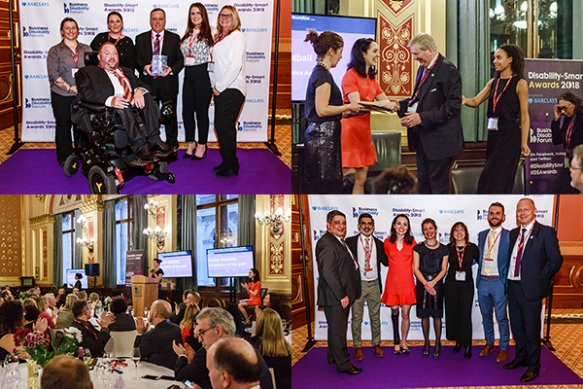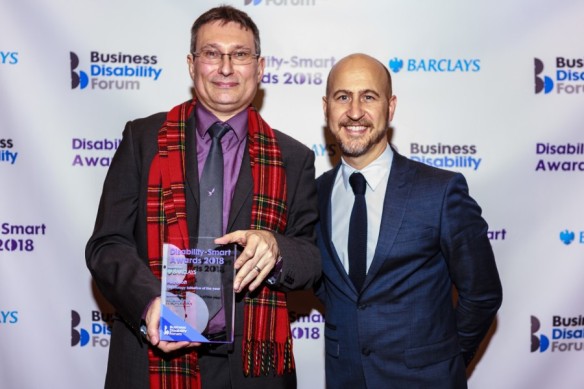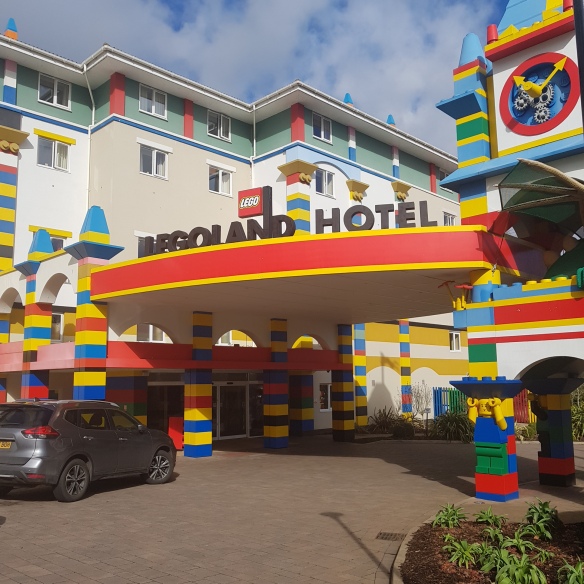Diane Lightfoot, Business Disability Forum
There’s still time to enter this year’s Disability Smart Awards – but hurry because the deadline is fast approaching!

Winners and nominees from Disability-Smart Awards 2018
There are many awards out there, so why do I think that the Disability-Smart Awards are so important? Well, of course, they are our awards – so I would, wouldn’t I? But in all seriousness, I believe that awards which mark the great work, commitment and achievements of our members (and non-members too; you don’t have to be a Business Disability Forum member to enter though of course we’d love you to join us!) and that’s really important in inspiring others and leading the way.
As I’ve said many times – including in these blogs – disability is too often seen as the poor relation when it comes to diversity. It is too often – still – parked in the too difficult, too sensitive, too complicated box. And too often the fear of getting things wrong means that people do – or say – nothing. But it really doesn’t have to be like that. Often the best solutions are the simplest – and often too the cheapest. Some of the greatest innovations we see around removing barriers are those that cost nothing and actually make the workplace a better place for everyone. Perhaps more importantly, disability is the only strand of diversity that can – and most likely, will – affect us all. So surely it is the one that really deserves our focus – and our celebration of when we get it right.
There is, rightly, a focus on media and social media around what doesn’t work for disabled people and issues that urgently need to be addressed if we are to achieve our goal of a truly equal and inclusive society for all. But equally I think, we need to focus on the successes and to recognising the many businesses, projects, programmes and initiatives that are truly innovating including disabled people, whether that’s in product design, as consumers, as employees, nationally or globally.
So, our Disability-Smart Awards are there to showcase amazing practice, to inspire others and to lead the way – and to recognise those businesses, teams and individuals who really have gone the extra mile and encouraging others to do the same.
We know that winning means a lot to our entrants; last year, Microsoft won the technology category last year for using cutting edge technologies to ensure their widely used products were as accessible to as many customers as possible. Hector Minto, Microsoft’s Tech Evangelist for Europe, Middle East and Africa, spoke about the impact of the Disability-Smart win at our Annual Conference in April and said:
“Winning the Disability-Smart award was very good for us, not just because of the Windows work but for what people don’t see, which is the number of employees with disabilities working as engineers on the product. It is not somebody doing something for people with disabilities, it is blind engineers, it is deaf engineers, it is people working and bringing their life experience to our product to make it better. “There is so much built into the product that empowers people routinely. But it really took the Disability Smart Award to get the message out clearly to the business world and the education world.”
And it’s not always the big companies that win – last year West Midlands Police beat stiff competition from EY and Guidant Global to win the Positive Cultural Change award, thanks to their focus on great evidence (well, they are the police…) and data – something which is often hard to come by.
Last year too, we introduced the popular Disabled People’s Choice Awards – with Liverpool Football Club as the runaway winner – and new awards for Global Leadership and for Diversity and Inclusion Practitioner. This year, we have also added new awards for Disability Smart Design, Disability Smart Influencer, Disability Smart Customer Service and Disability Smart Communications & Marketing Campaign.
The full list of categories for 2019 is:
- Disability Smart Senior Champion Award 2019
- Disability Smart Design Award (new category)
- Disability Smart Workplace Experience Award 2019 (sponsored by Microlink)
- Disability Smart Influencer Awards 2019 (new category)
- Disability Smart Technology for All Award 2019 (sponsored by Microlink)
- Disability Smart Customer Service Award 2019 (new category)
- Disability Smart Communications & Marketing Campaign Award 2019 (new category)
- Disability Smart Global Leader Award 2019
- Disability Smart Multinational Organisation Award 2019
- Disability Smart Diversity & Inclusion Practitioner Award 2019
- Disabled Peoples’ Choice Award 2019
You can find out all you need to know to enter here: https://businessdisabilityforum.org.uk/our-services/disability-smart-awards/
Entries close on 6 September and the awards ceremony which is once again being sponsored by our Founder Leader Barclays, takes place on 23 October at the Locarno Suite at the Foreign & Commonwealth Office. I will once again be co-hosting alongside Paralympian Stef Reid; those who were able to join us will know just what a fabulous and entertaining host she is!
I hope that you’ll be inspired to enter this year’s awards and remember: You have to be in it to win it!
Diane Lightfoot
CEO, Business Disability Forum




